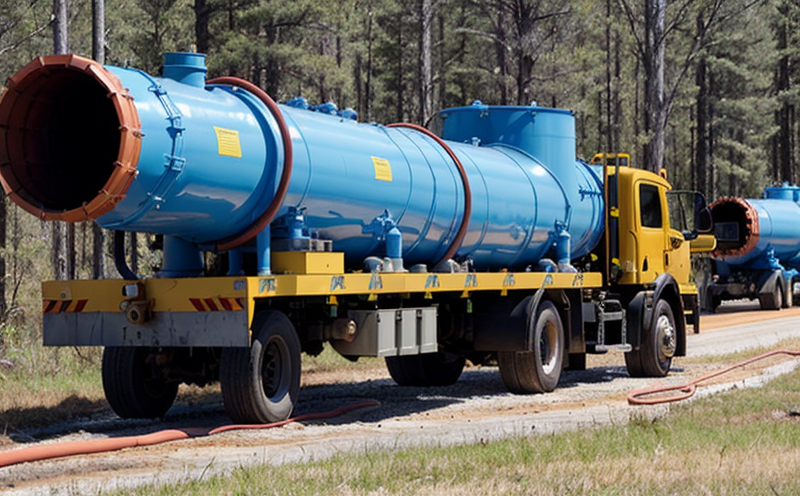IEC 60079 Explosion Protection Testing for Gas Distribution Equipment
The International Electrotechnical Commission (IEC) is a leading global organization that sets standards for electrical and electronic technologies. One of its critical standards, IEC 60079, specifically addresses explosion protection in equipment used in hazardous areas where flammable or explosive gases are present. This includes natural gas distribution systems and pipelines.
IEC 60079 is crucial for ensuring the safety of equipment designed to handle combustible gases like methane (CH4) found in natural gas distribution networks. The standard provides guidelines on how to test such equipment to ensure it can operate safely without causing ignition or explosions under defined conditions.
In natural gas distribution and pipeline systems, small leaks or malfunctions could potentially lead to hazardous situations if not properly managed. Therefore, IEC 60079 is particularly important for quality managers, compliance officers, R&D engineers, and procurement specialists who need to ensure their equipment meets stringent safety requirements.
The testing process involves exposing the gas distribution equipment to controlled environments where it simulates real-world conditions of temperature, pressure, and gas composition. The goal is to determine if the equipment can withstand these harsh conditions without causing ignition or explosion.
IEC 60079-31 specifically focuses on electrical apparatus for flammable gases, which are categorized into Class I, Division 2 zones where natural gas pipelines fall under. This standard ensures that all components of the equipment—such as motors, switches, and other electronic devices—are designed with intrinsic safety features to prevent sparks or heat generation.
Testing typically involves placing a specimen in an explosion hazard chamber where it is subjected to specific conditions such as temperature rise rates and gas concentrations. The results are then compared against predefined acceptance criteria provided by the standard.
This testing process ensures that only equipment meeting stringent safety standards enters the market, protecting both workers and consumers from potential hazards associated with natural gas distribution networks.
Understanding how IEC 60079 applies to your specific project or product is essential for ensuring compliance. Our laboratory can provide detailed technical support throughout the testing process, including advice on specimen preparation, instrumentation selection, and interpretation of results.
Applied Standards
The primary standard used in our IEC 60079-31 explosion protection testing for gas distribution equipment is ISO/IEC 60079-31:2018. This document specifies the requirements and methods for intrinsic safety of electrical apparatus intended to be used in atmospheres containing flammable gases, vapors, or mists.
Other relevant standards include:
- ISO 10078: Marking of electrical equipment for use in explosive atmospheres
- IEC 60079-2: Intrinsic safety - Part 2: Use of intrinsically safe apparatus - Methods of test
These standards work together to ensure that the equipment being tested meets all necessary criteria for safe operation in potentially hazardous environments.
Industry Applications
The application of IEC 60079-31 is primarily focused on ensuring safety in natural gas distribution systems and pipelines. These systems often operate within Class I Division 2 zones, making them prime candidates for intrinsic safety testing per this standard.
- Gas Pipelines: Ensuring the integrity of pipeline components such as valves, flanges, and pumps is critical to prevent leaks that could lead to explosions.
- Regulators: Regulators control pressure within pipelines, making them key pieces of equipment subject to intrinsic safety testing.
- Measurement Instruments: Devices used for monitoring gas flow rates must also comply with IEC 60079-31 to ensure accurate readings in potentially explosive atmospheres.
By adhering to these standards, manufacturers and operators can demonstrate their commitment to safety while also meeting regulatory requirements necessary for doing business in many countries around the world.
Use Cases and Application Examples
- Manufacturing Plants: Testing equipment used in manufacturing plants that handle natural gas, ensuring compliance with IEC 60079-31 is essential for preventing accidents.
- Tank Farms: Storage tanks for liquefied petroleum gas (LPG) and other flammable gases must meet intrinsic safety standards to avoid the risk of fires or explosions.
- Congestion Points: High-density areas where multiple pipelines converge, making them particularly vulnerable to leaks that could cause catastrophic incidents.
Our laboratory specializes in providing comprehensive testing services for all these applications. Whether you are developing new products or validating existing ones, we can help ensure they comply with IEC 60079-31 and other relevant standards.





